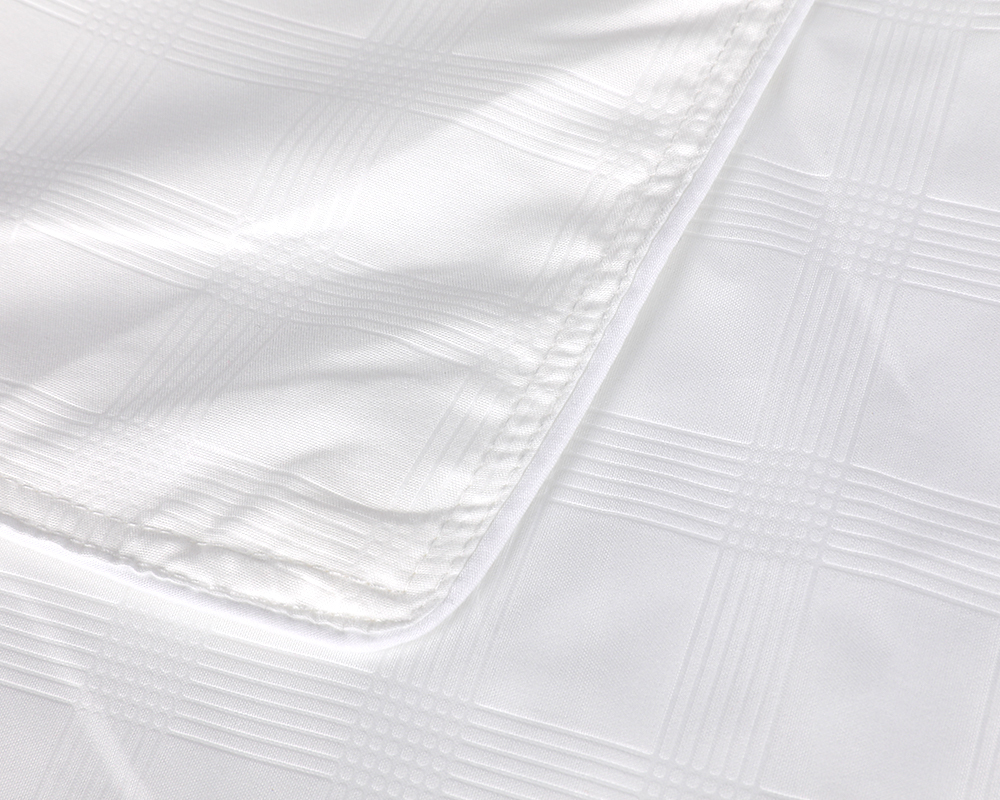Search...
Avoiding shrinkage, fading or damage to Home Textile Bedding Sets by overwashing mainly depends on taking proper care. Overwashing not only affects the appearance of bedding, but also reduces its service life. Here are some effective ways to avoid damage to bedding caused by overwashing:
Bedding does not need to be washed after every use unless there are obvious stains or odors. Under normal circumstances, wash bedding every two or three weeks. Frequent washing not only accelerates the wear of the fabric, but may also cause shrinkage and fading. Therefore, try to avoid overwashing.
Arrange the washing cycle reasonably according to the season, personal habits and hygiene requirements. For example, in the summer, because of more sweating, you may need to change the sheets more frequently, while in the winter, the washing interval can be appropriately extended.
Each set of bedding will have a corresponding care label, which provides the best washing method for the product. Different fabrics (such as pure cotton, silk, wool, etc.) have different requirements for washing temperature, method and detergent. Strictly follow the instructions on the care label to avoid damage caused by improper washing.
For example, pure cotton bedding can be washed in warm or cold water, but high temperatures should be avoided to prevent shrinkage. Silk bedding should be washed with a mild detergent and by hand or on a gentle cycle.
Different fabrics are sensitive to different water temperatures, and washing at too high a temperature can easily cause the fabric to shrink, fade, and lose shape. Especially for pure cotton, linen, and blended fabrics, high-temperature washing can shrink the fibers, causing the bedding to shrink. For sensitive fabrics such as silk and wool, hot water may cause shrinkage and damage.
Generally, it is recommended to wash bedding in cold or warm water (30-40°C) and avoid high-temperature washing.
Although strong detergents or bleaches can remove stains, they can also cause greater damage to the fabric, especially for brightly colored or soft bedding. When washing bedding, choose mild, non-irritating detergents and avoid products with strong chemical ingredients.

Choose detergents designed for home textiles, especially for bedding with hypoallergenic or antibacterial requirements.
Over-rinsing not only consumes energy, but can also cause the bedding fabric to lose its original color. Excessive rinsing can sometimes remove the natural oils in the fabric, causing it to become dry and brittle. Excessive rinsing can also cause fabrics to fade or lose shape.
Rinse moderately, avoid repeated washing, and try to take out the bedding to dry within one cycle after washing.
During the washing process, if the bedding is rubbed or rubbed too hard, it is easy to damage the fibers, especially for those more delicate fabrics (such as silk, wool, etc.). Excessive rubbing can also cause pilling or wrinkles on the surface of the fabric.
Try to use a laundry bag for washing, especially for fabrics that are easily damaged; or handle gently when washing by hand.
High-temperature drying opportunities can cause bedding to shrink, especially pure cotton, linen and blended bedding. Even if the washing machine has a drying function, long-term high-temperature drying should be avoided, especially when the fabric is marked "do not dry".
Try to choose natural drying, especially in a sunny place. For particularly delicate bedding, you can choose to dry it in a cool place to avoid fading caused by direct sunlight.
Different colors of bedding should be washed separately to avoid cross-staining of dark and light bedding during the washing process, especially when washing for the first time. Dark fabrics fade easily, and if mixed with light-colored bedding, the color may bleed into other fabrics.
Wash bedding separately according to color, especially when washing for the first time, separate dark and light colors to avoid staining.
When washing and drying bedding, try to avoid excessive squeezing or folding of bedding, especially when washing. If squeezed too much, bedding may lose elasticity and the fabric will be deformed.
Gently pat the washed bedding to stretch it naturally, and avoid over-wringing or squeezing.
If bedding is used frequently, you can consider turning it over or rotating it regularly to avoid excessive concentration on one side, evenly spread the number of washes, and extend the life of the bedding.
Regularly change sheets, quilt covers, etc. to ensure that all parts of the bedding are used reasonably to avoid damage caused by excessive wear.
Some bedding, especially dark fabrics, are easy to fade or damage. You can choose to use a special color protector to reduce the degree of fading, or use a waterproofing agent to enhance the stain resistance of the bedding.
Use a mild color protection or waterproofing product to ensure that no damage is caused to the fabric.
The key to avoiding shrinkage, fading or damage to the fabric of household textile bedding due to excessive washing is to properly choose the washing frequency, temperature, detergent and washing method. By properly arranging the washing cycle, following the instructions on the washing label, avoiding high temperature and excessive friction, etc., you can effectively extend the service life of the bedding and maintain its comfort and beauty.

 English
English
 中文简体
中文简体
 Español
Español





.jpg?imageView2/2/format/jp2)






